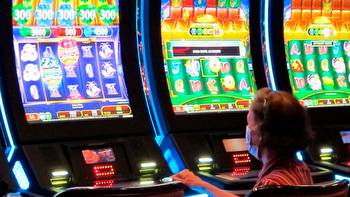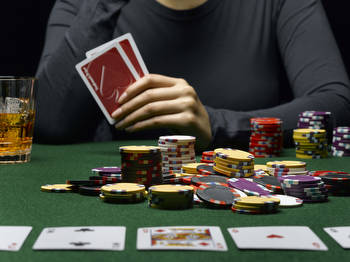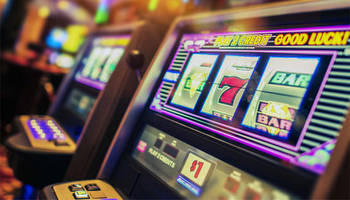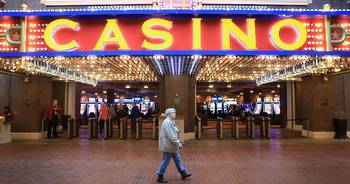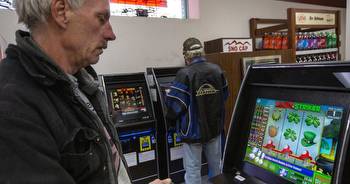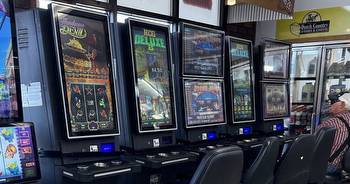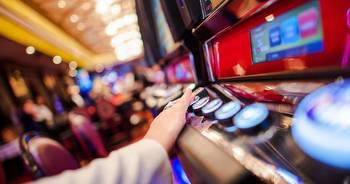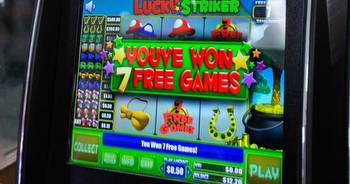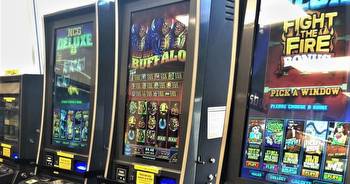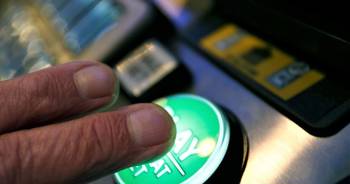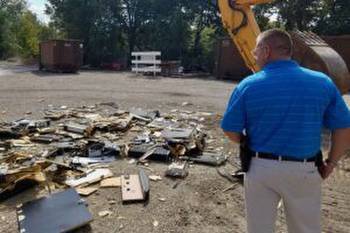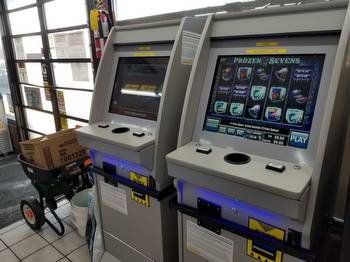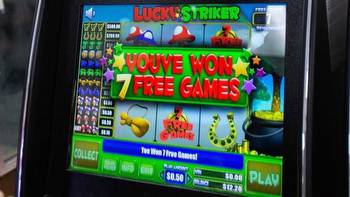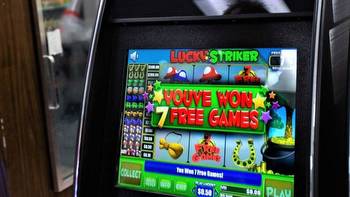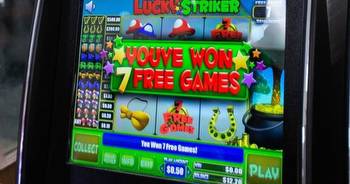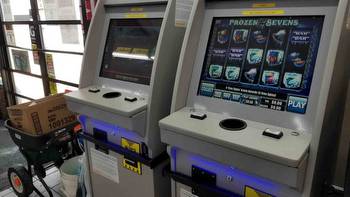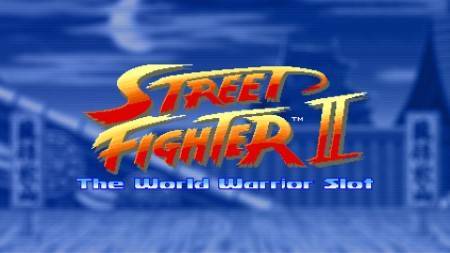As gambling expansion stalls in Missouri, Senate leader still trying to ban gas station slot machines
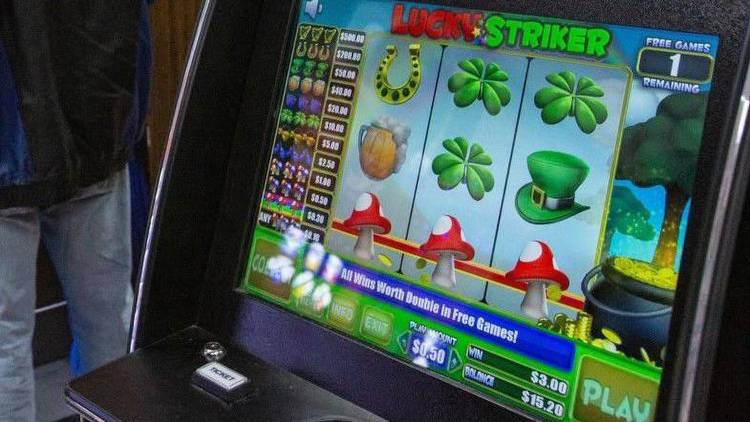
JEFFERSON CITY — A sweeping expansion of gambling in Missouri is likely off the table this year.
Senate President Pro Tem Dave Schatz, R-Sullivan, said an ongoing impasse among the state’s 13 casinos, sports betting proponents and backers of legalizing slot machines in truck stops and fraternal organizations will keep the expansion from moving forward in the final two weeks of the Legislature’s annual spring session.
But Schatz said he will continue to push ahead with what has become a priority during his tenure: cracking down on the unregulated video slot machines that companies have deployed to gas stations, bars and clubs across the state.
“I think one consensus agreement we had about gaming was on illegal gaming, and the eradication of illegal gaming,” Schatz said in comments to reporters on Thursday. “When it comes to expansion of gaming, I think that’s a subject that’s more challenging. But I think there’s bipartisan support, and probably enough support in this chamber to move forward (with the illegal gaming measures).”
Under current law, a “gambling device” is defined as a device “usable in the playing phases of any gambling activity.”
But companies such as Wildwood-based Torch Electronics claim their “no-chance games” aren’t gambling devices at all — because of an icon gamblers can press before placing a bet. The icon reveals the outcome of the bet they are placing.
But if the “pre-reveal” function shows the gambler losing, the only way for the gambler to place another bet is to move forward with the losing one. It is for that reason many gamblers choose not to see the outcome until after the bet is placed.
Schatz’s proposal specifies an illegal gambling device is any machine not approved by the Missouri Lottery or gaming commissions with a random number generator that issues cash prizes. It says such games are illegal even if the device “includes a preview of the outcome.”
Schatz said the main obstacle to getting his bill passed was the desire to tie his bill to an expansion of gambling. He also said the unregulated game operators’ lobbyists were “a very powerful force” in the Capitol.
“They can afford a very heavy lobbying effort in this building on this issue,” Schatz said.
Unlike regulated gaming, no proceeds are diverted to education. There are also no government-sanctioned resources for addicted gamblers or rules to protect consumers from low payouts.
Among the companies that has placed thousands of the unregulated, untaxed machines in gas stations, liquor stores and truck stops is Wildwood-based Torch Electronics, which has hired Strategic Capitol Consulting to lobby on its behalf.
The lobbying firm is owned by former House Speaker Steve Tilley. Records obtained through the Sunshine Law show one of its lobbyists, Tracy King, was in contact with Sen. Mike Moon, R-Ash Grove, in February as the gambling package was being debated in the Senate.
During debate on Schatz’s bill on Feb. 8, Moon raised numerous questions about the legislation, effectively delaying a vote on it. One part of Schatz’s bill bans entities convicted of illegal gambling from participating in any future regulated program.
“If we ever do expand this, we want operators that have proven that they’re legit,” Schatz said.
“You’re actually in this bill targeting a specific type of machine that is considered illegal,” Moon said.
“We’re defining so that there is no gray area,” Schatz said.
During another debate on the package on Tuesday, Moon raised concerns about the need to hire additional state workers to oversee the program. Under one analysis, there would be a need for more than 30 more employees.
“That’s a lot of government,” Moon said.
Sen. Denny Hoskins, a Warrensburg Republican who is sponsoring the expansion package, said the extra salaries would be offset by an estimated $250 million in taxes and fees that would be generated by legalized slot machines and sports betting.
“Make no mistake, Senate Bill 98 is about additional revenue for the state of Missouri,” Hoskins said.
Moon wasn’t the only senator raising questions about the overall expansion.
“This bill has got a lot of moving parts,” said Sen. Paul Wieland, R-Imperial, who said he opposed allowing slot machines in bars.
The measure stalled Tuesday when the Senate approved an amendment to Hoskins’ legislation added by Moon that would send the expansion to a public vote.
Hoskins said that maneuver likely killed the effort for the year, putting Missouri behind other states where gambling has expanded.
Legally betting on sports was barred in all states except Nevada until a 2018 U.S. Supreme Court ruling that allowed all states to offer it.
States surrounding Missouri have legalized the practice and are earning money off taxes and fees generated by people placing bets on sporting events.
Legalized slot machines also have expanded outside of casinos. Illinois now has thousands of machines in bars, restaurants, convenience stores, truck stops and other locations, resulting in a financial hit to the casinos.
Under Hoskins’ omnibus bill, as many as 10,000 terminals could have been placed in taverns, truck stops, veterans’ organizations and fraternal clubs like the Eagles.
Each location would be limited to five machines and bets would be capped at $5.
The measure would also have allowed the Missouri Gaming Commission to license the state’s 13 casinos to offer sports betting. Wagering on high school sports contests would be prohibited.
And the proposal would make the machines operated by companies like Torch illegal. It would give retailers 10 days to remove the machines.
Along with its lobbying, Torch has been active in defending against attempts to deem its machines illegal.
In February, the company joined with Warrenton Oil to file a lawsuit asking a Cole County judge to issue an order stopping the Missouri Highway Patrol from seizing machines as part of a crackdown on illegal gambling.
“The Highway Patrol has engaged in a long running campaign of harassment of stores, like Warrenton Oil’s stores, that house Torch amusement devices,” the lawsuit notes.
The suit was filed Feb. 5, three days after the Highway Patrol seized three machines from a St. Clair location owned by Warrenton Oil.
In addition, the lawsuit said state and local police “have intimidated and harassed convenience stores in Linn, Crawford, Barry, Vernon, Camden, Henry and Webster counties that license space for the Torch amusement devices.”
The lawsuit also said Torch amusement devices were seized from Warrenton Oil convenience stores in Franklin County and from other convenience stores in Henry and Linn counties.
Torch also has including Gov. Mike Parson, House Speaker Rob Vescovo and others.
The legislation is Senate Bill 98.








